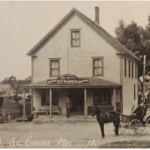CHINA: Community Resilience Partnership explained
 by Mary Grow
by Mary Grow
Olivia Kunesh from the Kennebec Valley Council of Governments (KVCOG) explained the state-wide Community Resilience Partnership (CRP) program at an April 24 meeting in China.
The entire select board and another 10 or so residents attended the presentation, some in person at the town office and some participating virtually.
Kunesh said the state-funded program involves:
- A municipality, like China, applying to its regional group, like KVCOG, to become a community resilience partner for a two-year term, renewable.
- Town officials and residents, with KVCOG assistance, defining and prioritizing projects to increase resilience in town and applying for state grants to fund the projects.
- Assuming project approval, the state awarding money both to the town for its project(s) and to KVCOG to cover its expenses helping the town.
The concept of resilience projects is aimed at reacting to climate change, but is broadly defined. Select board member Janet Preston, China’s representative to KVCOG, said projects could include transportation, building modernization, clean energy, protection for natural resources and the environment, public health, engaging businesses in these activities and clean-up after flooding.
Ideas Preston had already received included improving the boat landing at South China; providing transportation for senior citizens (or public transportation for all residents, a meeting participant suggested); replacing culverts to handle more water; building sidewalks in China Village; setting up electric vehicle charging stations; adding energy-saving measures for municipal buildings; and expanding Thurston Park.
Several audience members live near the South China boat landing and endorsed improving it. Phillip deMaynardier, for the Thurston Park Committee, recommended seeking a grant for maintenance and improvements in the park.
Christopher Hahn asked if broadband service expansion could be covered; Preston added it to her list. Thomas Rumpf suggested solar energy for the building in the China School Forest.
Select board members asked who would be responsible for maintaining grant-funded projects, like electric vehicle charging stations. Kunesh replied that the CRP program is too new for the question to have arisen.
Grants are awarded twice a year, so a municipality joining the program could apply for up to four grants during its two-year membership, Kunesh said. The maximum grant is currently $50,000 for one town; a multi-town partnership could request up to $125,000.
The April 24 public meeting was the first step in applying to join KVCOG’s CRP. The next step is for the select board to vote to apply; members seemed to be leaning in favor.
If China joins the program, the select board would involve residents in setting priorities. Board members briefly discussed ways to inform residents of the pros and cons of possible projects and to collect opinions.
Responsible journalism is hard work!
It is also expensive!
If you enjoy reading The Town Line and the good news we bring you each week, would you consider a donation to help us continue the work we’re doing?
The Town Line is a 501(c)(3) nonprofit private foundation, and all donations are tax deductible under the Internal Revenue Service code.
To help, please visit our online donation page or mail a check payable to The Town Line, PO Box 89, South China, ME 04358. Your contribution is appreciated!





Leave a Reply
Want to join the discussion?Feel free to contribute!